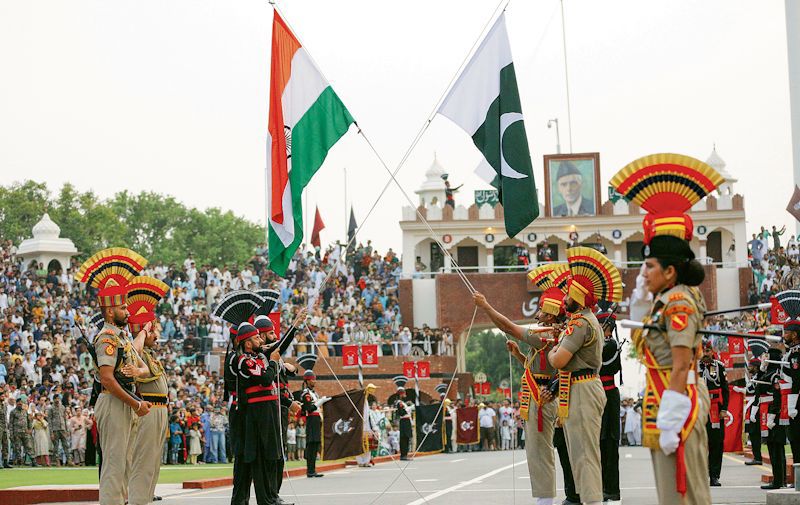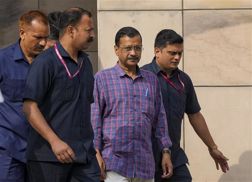
Imperative: Issues relating to fishermen, civilian prisoners and inadvertent border crossers should be seen through the prism of human rights. ANI
Vivek Katju
Former Secretary, Ministry of External Affairs
A report in The Tribune (March 30) gave an account of two Pakistani boys who are languishing in the Faridkot Observation Home for convicted juveniles and undertrials. The boys had ‘strayed’ into Indian territory in the Tarn Taran area on August 31, 2022. They were acquitted by the Juvenile Justice Board on
July 18, 2023. There was no indication of the action taken by the board or the Punjab authorities to ensure their early repatriation to their home country.
The NHRCs of both countries would be able to give this category of humanitarian matters higher priority than the diplomatic establishment.
According to the report, Justice NS Shekhawat of the Punjab and Haryana High Court inspected the observation home in January this year. He found the boys’ presence unwarranted and asked the authorities to make arrangements to send them back to Pakistan. They were taken to the Attari border on March 29, but Pakistani immigration officials declined to accept them because they did not have any directions from their authorities. The report stated that the Faridkot District and Sessions Judge had taken up the matter with the Ministry of External Affairs so that the juveniles could be sent home.
I have given a detailed account of this report as it vividly illustrates the fate of Indians and Pakistanis who inadvertently enter the other country’s territory. There were times, especially when the bilateral relationship was going through a less hostile phase, when the Border Security Force and Pakistani Rangers, after ascertaining that the persons concerned had mistakenly strayed, informally handed them over to the other side. The officials on the ‘other side’ questioned them, and if they were satisfied with their bona fides, they allowed them to cross over and go to their homes.
Once the border crossers are handed over to the police, the immigration laws are invoked and they are prosecuted and sentenced to imprisonment. This results in their spending many years in jail. That is sad for inadvertent border crossers. What is worse, they are compelled to spend time in custody even after they have served their sentences, or, as in this case, the Juvenile Justice Board has ordered that they be repatriated. Their cases are not given priority by the respective foreign ministries or other authorities. They simply become victims of the India-Pakistan relationship, which in such cases follows the time-honoured tradition of organising collective exchanges from time to time.
The fate of fishermen, civilian prisoners and inadvertent border crossers is part of what in the India-Pakistan diplomatic lexicon is considered to be a humanitarian issue. Other matters within this rubric pertain to Indians and Pakistanis who wish to visit the other country for religious reasons or to meet relatives. Another issue is the intention of some Pakistanis to travel to India for medical treatment. The absence of effective diplomatic ties between the two countries since Pakistan’s irrational response to the constitutional changes in Jammu and Kashmir in August 2019 has adversely impacted these humanitarian issues. The only partial exception has been the visit of Sikh jathas to Pakistan on religious occasions.
The entire gamut of the India-Pakistan bilateral ties covers issues relating to (i) cooperation, such as in trade and commerce; (ii) addressing contentious matters such as Sir Creek, terrorism and J&K; and (iii) humanitarian concerns. When the bilateral relations were revived in early 1997 after a hiatus of over four years, the Pakistanis insisted that all issues should be addressed in an integrated manner. At that stage, Pakistan thought that India was interested in focusing on commercial and economic cooperation instead of resolving outstanding issues because if a strong pro-bilateral trade lobby developed in Pakistan, it would exert pressure on the establishment to put contentious issues, including J&K, on the back burner. Amidst this dichotomy, the political and diplomatic authorities did not give the attention to humanitarian issues that they deserved. Consequently, delays in releasing fishermen and civilian prisoners were overlooked. Sometimes, though, the courts in both countries have acted positively to help the victims.
This writer has had experience of dealing with India-Pakistan matters during his diplomatic career. I had advocated that humanitarian issues relating to fishermen, civilian prisoners and inadvertent border crossers should be seen through the prism of human rights and that the National Human Rights Commissions (NHRCs) of the two countries should be given the responsibility to handle them. This may require that Pakistan enact legislation to create an official body for this purpose, with its remit limited only to these matters.
The two bodies can decide, with the approval of other ministries and agencies concerned, on matters concerning consular access to confirm the national identity of fishermen and civilian prisoners. They can, thereafter, focus on how they would monitor cases of these categories of persons so that they can return very early after serving their sentences. This would naturally be in cases where citizens of the other country have been convicted.
The NHRCs of both countries would be able to give this category of humanitarian matters higher priority than the diplomatic establishment. This would also insulate these issues from the status of the bilateral relationship. Beginning with these issues, they may also generate confidence to offer suggestions on matters relating to visas for relatives and other categories too. Naturally, those accused of or convicted of espionage or terrorism would not be within the remit of the suggested mechanism.
The two countries must strive to ensure that a case such as that of the two Pakistani juveniles in Faridkot is not repeated. And Pakistan should take them back immediately so as to reunite them with their families.
Join Whatsapp Channel of The Tribune for latest updates.



























